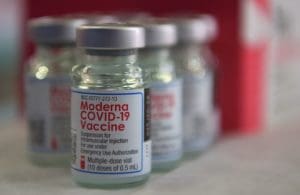
Vials containing the Moderna COVID-19 vaccine. [Image from Wikipedia]
A third dose of the company’s existing mRNA-1273 appears to improve immune response against the B.1.351 variant that first emerged in South Africa. But a booster dose of mRNA-1273.351, which was developed based on the South African variant, led to higher titers against B.1.351. Both vaccines also appear to offer superior protection against P.1, the lineage first identified in Brazil.
Moderna announced that both boosters were generally well tolerated.
Pfizer (NYSE:PFE) and BioNTech (NSDQ:BNTX) have a Phase 1/2/3 trial underway testing the use of a third dose of their COVID-19 vaccine. The two companies have also planned to develop a variant-specific vaccine booster.
Moderna’s recent research also provides evidence that its existing mRNA-1273 offers durable protection against SARS-CoV-2. “The strong and rapid boost in titers to levels above primary vaccination also clearly demonstrates the ability of mRNA-1273 to induce immune memory,” said Stéphane Bancel, Moderna CEO, in a statement.
The mRNA platform also supports future bespoke versions of the SARS-CoV-2 to optimize protection against common variants. “Our mRNA platform allows for rapid design of vaccine candidates that incorporate key virus mutations, potentially allowing for faster development of future alternative variant-matched vaccines should they be needed,” Bancel said.
The company is also testing a multivalent booster candidate known as mRNA-1273.211 that combines mRNA-1273 and mRNA-1273.351. The mRNA-1273.211 vaccine is a 50/50 blend of its currently authorized vaccine and mRNA-1273.351.
In Moderna’s Phase 2 trial, volunteers received boosters approximately six to eight months after they were immunized with two vaccine doses.
Filed Under: clinical trials, Drug Discovery, Infectious Disease





Tell Us What You Think!
You must be logged in to post a comment.